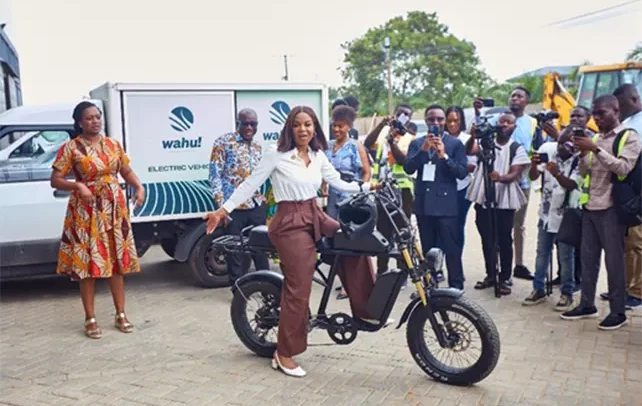A participant taking a ride on the e-bike
Wahu Mobility hosted a visit from the United Nations (UN) and partners on Friday, June 13, 2025, to demonstrate the e-bikes the company plans to roll-out across Ghana and Africa.
The company hosted Sustainable Energy for All, an independent organisation aiming to accelerate the transition to renewable energy resources in emerging and developing countries, and the UN in Ghana.
A showcase was given for the new e-bike, as well as testimonials from users and the bike’s engineers.
The visit was in partnership with the Ghana Investment Promotion Centre (GIPC), which aims to make Ghana the most attractive option for external investment in Africa, and highlighted how a transition to low-carbon transportation services can simultaneously produce employment opportunities.
Wahu Mobility are the first e-bike manufacturer based in Ghana, and while it plans to release its bikes to the public in the future, their e-bikes are already used by services such as Bolt.
The company is currently looking for more businesses to partner with to expand its e-bike roll-out.
Sustainable Energy for All and the UN in Ghana’s visit comes as Ghana tries to reduce its carbon emissions to mitigate the risks of climate change.
Ghana’s annual emissions (not accounting for the emissions of traded goods into the country) peaked in 2021 with 20.55 million tonnes of CO2, but this figure decreased in 2022 and 2023 – a figure for 2024 has yet to be calculated.
Wahu Mobility’s facility is an example of how Ghana’s Energy Transition and Investment Plan, which aims to make Ghana net-zero by 2060 and make the country’s industrial development more sustainable, is providing private investment in homegrown technology to solve the problems posed by climate change.
The e-bike project was praised by CEO and Special Representative of the UN Secretary-General for Sustainable Energy for All, and Co-Chair of UN-Energy, Damilola Ogunbiyi, who said at the event, “it demonstrates the practical value of Ghana’s Energy Transition and Investment Plan, the world-class roadmap for the country’s net zero ambitions.”
He also said that, “Ghana has taken an economy-wide approach to its decarbonisation journey, with transport electrification driving 40% of emissions reduction required. This transition is not just about transitioning energy and the transport sector; it is about revolutionising how people live, move and work in a greener economy.”
By James Reinhardt


